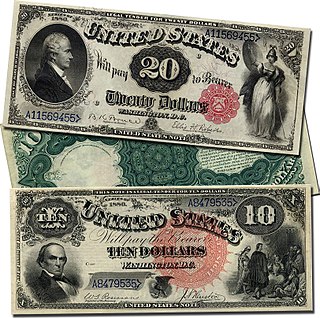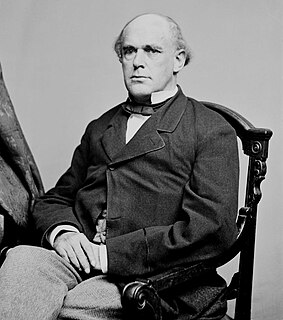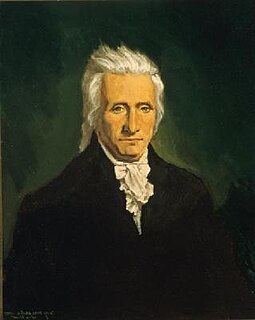In United States constitutional law, a regulatory taking occurs when governmental regulations limit the use of private property to such a degree that the landowner is effectively deprived of all economically reasonable use or value of their property. Under the Fifth Amendment to the United States Constitution governments are required to pay just compensation for such takings. The amendment is incorporated to the states via the Due Process Clause of the Fourteenth Amendment.
Ex parte Milligan, 71 U.S. 2 (1866), was a landmark decision of the US Supreme Court that ruled that the use of military tribunals to try civilians when civil courts are operating is unconstitutional. In this particular case, the Court was unwilling to give President Abraham Lincoln's administration the power of military commission jurisdiction, part of the administration's controversial plan to deal with Union dissenters during the American Civil War. Justice David Davis, who delivered the majority opinion, stated that "martial rule can never exist when the courts are open" and confined martial law to areas of "military operations, where war really prevails", and when it was a necessity to provide a substitute for a civil authority that had been overthrown. Chief Justice Salmon P. Chase and three associate justices filed a separate opinion concurring with the majority in the judgment, but asserting that Congress had the power to authorize a military commission, although it had not done so in Milligan's case.
United States v. Klein, 80 U.S. 128 (1871), was a landmark United States Supreme Court case stemming from the American Civil War (1861–1865).

A United States Note, also known as a Legal Tender Note, is a type of paper money that was issued from 1862 to 1971 in the U.S. Having been current for 109 years, they were issued for longer than any other form of U.S. paper money. They were known popularly as "greenbacks", a name inherited from the earlier greenbacks, the Demand Notes, that they replaced in 1862. Often termed Legal Tender Notes, they were named United States Notes by the First Legal Tender Act, which authorized them as a form of fiat currency. During the 1860s the so-called second obligation on the reverse of the notes stated:
This Note is a Legal Tender for all debts public and private except Duties on Imports and Interest on the Public Debt; and is receivable in payment of all loans made to the United States.

Salmon Portland Chase was an American politician and jurist who served as the sixth chief justice of the United States. He also served as the 23rd governor of Ohio, represented Ohio in the United States Senate, and served as the 25th United States Secretary of the Treasury. Chase was therefore one of a few American politicians who served in all three branches of the federal government.

Nathan Clifford was an American statesman, diplomat and jurist.

Ebenezer Rockwood Hoar was an American politician, lawyer, and jurist from Massachusetts. He served as U.S. Attorney General from 1869 to 1870, and was the first head of the newly created Department of Justice. Hoar assisted President Ulysses S. Grant in appointing two United States Supreme Court justices and was himself nominated to the Court. His nomination was rejected by the United States Senate, in part for his positions on patronage reform. In 1871, Hoar was appointed by Grant to the United States high commission that negotiated the Treaty of Washington between the U.S. and the United Kingdom, helping to settle the Alabama Claims.
Article I, Section 10, Clause 1 of the United States Constitution, known as the Contract Clause, imposes certain prohibitions on the states. These prohibitions are meant to protect individuals from intrusion by state governments and to keep the states from intruding on the enumerated powers of the U.S. federal government.
Hepburn v. Griswold, 75 U.S. 603 (1870), was a United States Supreme Court case in which the Chief Justice of the United States, Salmon P. Chase, speaking for the Court, declared certain parts of the Legal Tender Acts to be unconstitutional. Specifically, making United States Notes legal tender was unconstitutional.
The Legal Tender Cases were two 1871 United States Supreme Court cases that affirmed the constitutionality of paper money. The two cases were Knox v. Lee and Parker v. Davis.

John Curtiss Underwood was an attorney, abolitionist politician and a United States district judge of the United States District Court for the District of Virginia and the United States District Court for the Eastern District of Virginia.

The Chase Court refers to the Supreme Court of the United States from 1864 to 1873, when Salmon P. Chase served as the sixth Chief Justice of the United States. Chase succeeded Roger Taney as Chief Justice after the latter's death. Appointed by President Abraham Lincoln, Chase served as Chief Justice until his death, at which point Morrison Waite was nominated and confirmed as his successor.

Gabriel Duvall was an American politician and jurist. Duvall was an Associate Justice of the Supreme Court of the United States from 1811 to 1835, during the Marshall Court. Previously, Duvall was the Comptroller of the Treasury, a Maryland state court judge, a member of the U.S. House of Representatives from Maryland, and a Maryland state legislator.
Juilliard v. Greenman, 110 U.S. 421 (1884), was a Supreme Court of the United States case in which issuance of greenbacks as legal tender in peacetime was challenged. The Legal Tender Acts of 1862 and 1863 were upheld.
Willard v. Tayloe, 75 U.S. 557 (1869), was a decision by the Supreme Court of the United States that courts of equity deciding issues of contract have discretion to determine the form of relief based on the circumstances of each individual case. The Court established a new rule to determine the form of relief: Relief should serve the ends of justice, and should be withheld if it appears likely to produce hardship or injustice to either party.
Catherine Gertrude Roraback was a civil rights attorney in Connecticut, best known for representing Estelle Griswold and Dr. C. Lee Buxton in the famous 1965 Supreme Court case, Griswold v. Connecticut, which legalized the use of birth control in Connecticut and created the precedent of the right to privacy. She is also known for such cases as the New Haven Black Panther trials of 1971, in which she defended Black Panther member Ericka Huggins after she was accused of murder. Roraback dealt with issues such as women's rights and racial discrimination, and lived her life to defend the rights of the "dissenters and the dispossessed".
United States v. Lee, 106 U.S. 196 (1882), is a 5-to-4 ruling by the United States Supreme Court which held that the Constitution's prohibition on lawsuits against the federal government did not extend to officers of the government themselves. The case involved the heir of Mary Anna Custis Lee, wife of Confederate States of America General Robert E. Lee, who sued to regain control of Arlington House and its grounds. Arlington had been seized by the United States government in 1861 and eventually converted into Arlington National Cemetery. The estate had been sold to pay outstanding taxes, but the lawsuit contested the tax sale as improper. A jury found in favor of the Lees. The Supreme Court, too, concluded that the tax sale was illegal. In stripping the federal officers of their sovereign immunity, the Supreme Court agreed that suit against them was proper.

In United States constitutional law, the penumbra includes a group of rights derived, by implication, from other rights explicitly protected in the Bill of Rights. These rights have been identified through a process of "reasoning-by-interpolation", where specific principles are recognized from "general idea[s]" that are explicitly expressed in other constitutional provisions. Although researchers have traced the origin of the term to the nineteenth century, the term first gained significant popular attention in 1965, when Justice William O. Douglas's majority opinion in Griswold v. Connecticut identified a right to privacy in the penumbra of the constitution.









